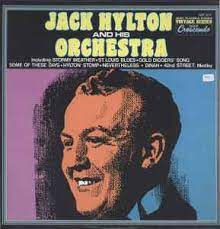
Daily Dose Of Jazz…
Jack Hylton was born John Greenhalgh Hilton on July 2, 1892 in Great Lever near Bolton, Lancashire, England the son of a cotton yarn twister and an amateur singer at the local Labour Club. He learned piano to accompany him on the stage and later sang to the customers when his father bought a pub in nearby Little Lever, becoming known as the Singing Mill-Boy. He also performed as a relief pianist for various bands.
Moving to London, England as a pianist in the 400 Club during his early career and playing with the Stroud Haxton Band. During World War I he became musical director of the band of the 20th Hussars, and later in the Army Entertainment Division. After the war Hylton formed a double act with Tommy Handley to little success, played with the Queens Dance Orchestra, wrote arrangements of popular songs and recorded them for His Master’s Voice and Zonophone under the label Directed by Jack Hylton. His records carried the new style of jazz-derived American dance music.
Dismissed by his own bandmates from the Queen’s Hall in 1922, Jack not only set up his own band, but also set up a number of other orchestras under the Jack Hylton Organisation. Even though he was not professionally trained for business, he brought his band to success during the Great Depression. He is credited for bringing Duke Ellington, Louis Armstrong and others to Britain and Europe in the 1930s.
Hylton also became a director and major shareholder of the new Decca record label, recorded with Paul Robeson, and made the first transatlantic entertainment broadcast with Paul Whiteman and his orchestra. He performed in the United States when Standard Oil signed him for a radio show on CBS. Returning to Britain he toured Europe, appeared on radio and television and finally disbanded by 1940.
He continued to conduct orchestras for radio in the years to come, leading the Glenn Miller Orchestra when it visited England in 1943. During the war, he took the London Philharmonic Orchestra around Britain, giving promenade concerts. At this point in his career he became an impresario, discovering new stars and managing radio, film and theatre productions.
The Fifties saw him reuniting with old band members for that year’s Royal Command Performance, billed as “The Band that Jack Built”. He founded Jack Hylton Television Productions, which lasted until 1960. IIn his final years Hylton was still producing stage shows, as well as taking a leading role in organising various Royal Command Performances, until his final stage production, Camelot, in 1965.
Complaining of chest and stomach pains he was admitted to the London Clinic, where three days later on January 29, 1965 1892~1965 | pianist, composer, bandleader and impresario Jack Hylton transitioned from a heart attack. He was 72.
More Posts: bandleader,history,impresario,instrumental,jazz,music,piano


